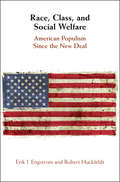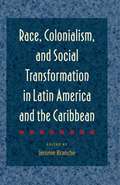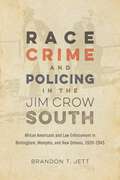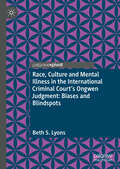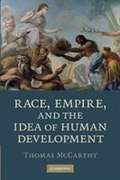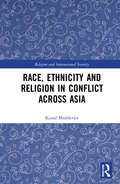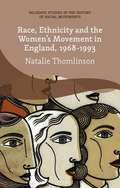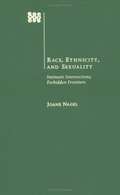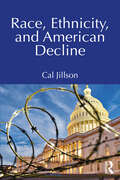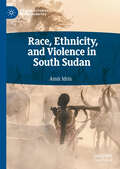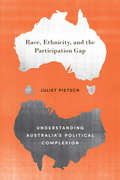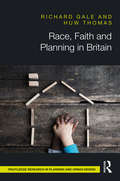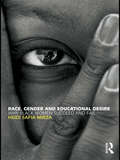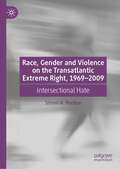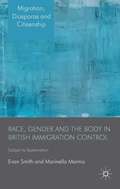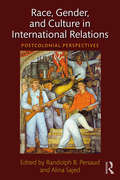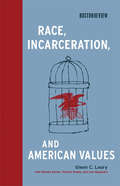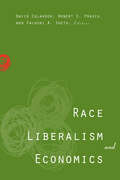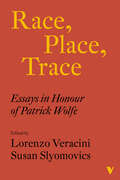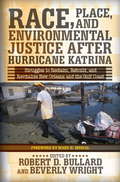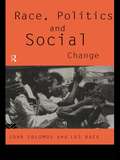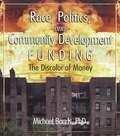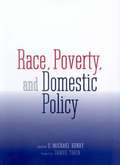- Table View
- List View
Race, Class, and Social Welfare: American Populism Since the New Deal
by Erik J. Engstrom Robert HuckfeldtWhat makes it so difficult to enact and sustain comprehensive social welfare policy that would aid the disadvantaged in the United States? Addressing the relationship between populism and social welfare, this book argues that two competing camps of populists divide American politics. Regressive populists motivated by racial resentment frequently clash with progressive populists, who embrace an expansion of social welfare benefits for the less affluent, regardless of race or ethnicity. Engstrom and Huckfeldt uncover the political forces driving this divided populism, its roots in the aftermath of the civil rights revolution of the mid-twentieth century, and its implications for modern American politics and social welfare policy. Relying on a detailed analysis of party coalitions in the US Congress and the electorate since the New Deal, the authors focus on the intersection between race, class, and oligarchy.
Race, Colonialism, and Social Transformation in Latin America and the Caribbean
by Jerome BrancheThis collection of essays offers a comprehensive overview of colonial legacies of racial and social inequality in Latin America and the Caribbean. Rich in theoretical framework and close textual analysis, these essays offer new paradigms and approaches to both reading and resolving the opposing forces of race, class, and the power of states. The contributors are drawn from a variety of fields, including literary criticism, anthropology, politics, and sociology. The contributors to this book abandon the traditional approaches that study racialized oppression in Latin America only from the standpoint of its impact on either Indians or people of African descent. Instead they examine colonialism's domination and legacy in terms of both the political power it wielded and the symbolic instruments of that oppression. The volume's scope extends from the Southern Cone to the Andean region, Mexico, and the Hispanophone and Francophone Caribbean. It contests many of the traditional givens about Latin America, including governance and the nation state, the effects of globalization, the legacy of the region's criollo philosophers and men of letters, and postulations of harmonious race relations. As dictatorships give way to democracies in a variety of unprecedented ways, this book offers a necessary and needed examination of the social transformations in the region.
Race, Crime, and Policing in the Jim Crow South: African Americans and Law Enforcement in Birmingham, Memphis, and New Orleans, 1920–1945 (Making the Modern South)
by Brandon T. JettThroughout the Jim Crow era, southern police departments played a vital role in the maintenance of white supremacy. Police targeted African Americans through an array of actions, including violent interactions, unjust arrests, and the enforcement of segregation laws and customs. Scholars have devoted much attention to law enforcement’s use of aggression and brutality as a means of maintaining African American subordination. While these interpretations are vital to the broader understanding of police and minority relations, Black citizens have often come off as powerless in their encounters with law enforcement. Brandon T. Jett’s Race, Crime, and Policing in the Jim Crow South, by contrast, reveals previously unrecognized efforts by African Americans to use, manage, and exploit policing. In the process, Jett exposes a much more complex relationship, suggesting that while violence or the threat of violence shaped police and minority relations, it did not define all interactions. Black residents of southern cities repeatedly complained about violent policing strategies and law enforcement’s seeming lack of interest in crimes committed against African Americans. These criticisms notwithstanding, Blacks also voiced a desire for the police to become more involved in their communities to reduce the seemingly intractable problem of crime, much of which resulted from racial discrimination and other structural factors related to Jim Crow. Although the actions of the police were problematic, African Americans nonetheless believed that law enforcement could play a role in reducing crime in their communities. During the first half of the twentieth century, Black citizens repeatedly demanded better policing and engaged in behaviors designed to extract services from law enforcement officers in Black neighborhoods as part of a broader strategy to make their communities safer. By examining the myriad ways in which African Americans influenced the police to serve the interests of the Black community, Jett adds a new layer to our understanding of race relations in the urban South in the Jim Crow era and contributes to current debates around the relationship between the police and minorities in the United States.
Race, Culture and Mental Illness in the International Criminal Court’s Ongwen Judgment: Biases and Blindspots
by Beth S. LyonsDominic Ongwen was abducted in 1987 when he was 8 or 9 years old by the Lord’s Resistance Army (‘LRA’) in Northern Uganda and trafficked as a child soldier; he made multiple unsuccessful attempts to escape, and finally succeeded in late 2014. He turned himself into the International Criminal Court in 2015 and was prosecuted. Mr. Ongwen’s defence was that he was not responsible for the crimes of the LRA, based on his mental illnesses and duress, stemming from his abduction and subsequent coercion and indoctrination under Joseph Kony within the LRA. In February 2021, the ICC’s Trial Chamber IX convicted Dominic Ongwen of 61 charges and two modes of liability and he was sentenced to 25 years incarceration. This work critiques the judicial racial and cultural biases and blindspots in the Ongwen Judgment rendered by the ICC, as related to the affirmative defences of mental disease or defect and duress and to sentencing, from the perspective of the author who served as a defence counsel in the case.
Race, Empire and First World War Writing
by Santanu DasThis volume brings together an international cast of scholars from a variety of fields to examine the racial and colonial aspects of the First World War, and show how issues of race and empire shaped its literature and culture. The global nature of the First World War is fast becoming the focus of intense inquiry. This book analyses European discourses about colonial participation and recovers the war experience of different racial, ethnic and national groups, including the Chinese, Vietnamese, Indians, Maori, West Africans and Jamaicans. It also investigates testimonial and literary writings, from war diaries and nursing memoirs to Irish, New Zealand and African American literature, and analyses processes of memory and commemoration in the former colonies and dominions. Drawing upon archival, literary and visual material, the book provides a compelling account of the conflict's reverberations in Europe and its empires and reclaims the multiracial dimensions of war memory.
Race, Empire, and the Idea of Human Development
by Thomas McCarthyThomas McCarthy analyzes the ideologies of race and empire that were integral to European-American expansion. He highlights the central role that conceptions of human development played in answering challenges to legitimacy through a hierarchical ordering of difference.
Race, Ethnicity and Religion in Conflict Across Asia (Religion and International Security)
by Kunal MukherjeeThis book looks at conflict zones in the Asia Pacific with a special focus on secessionist groups/movements in the Indian Northeast, Tibet, Chinese Xinjiang, the Burmese borderlands, Kashmir in South Asia, CHT in Bangladesh, South Thailand, and Aceh in Indonesia. These conflict zones are predominantly ethnic minority provinces, which by and large do not share a sense of one-ness with the country that they are currently a part of; most of these insurgencies have had strong linkages with separatist nationalist groups in the region. Methodologically, the author uses extensive fieldwork, interview data, and participant observation from these conflict zones to take a bottom-up approach, giving importance to the voices of ordinary people and/or the residents of these conflict zones whose voices have generally been ignored. Although the book looks at both the historical background and contemporary dimensions of these conflicts, the author focuses on exploring how the role of race, ethnicity and religion in these conflicts can be both direct and indirect. This book will be of great interest to students and scholars of conflict and security in contemporary Asia with a background in politics, history, IR, security studies, religion, and sociology.
Race, Ethnicity and the Women's Movement in England, 1968-1993 (Palgrave Studies in the History of Social Movements)
by Natalie ThomlinsonThis book is the first archive-based account of the charged debates around race in the women's movement in England during the 'second wave' period. Examining both the white and the Black women's movement through a source base that includes original oral histories and extensive research using feminist periodicals, this book seeks to unpack the historical roots of long-running tensions between Black and white feminists. It gives a broad overview of the activism that both Black and white women were involved in, and examines the Black feminist critique of white feminists as racist, how white feminists reacted to this critique, and asks why the women's movement was so unable to engage with the concerns of Black women. Through doing so, the book speaks to many present day concerns within the women's movement about the politics of race, and indeed the place of identity politics within the left more broadly.
Race, Ethnicity, And Sexuality: Intimate Intersections, Forbidden Frontiers
by Joane NagelWhat's sex got to do with race? With ethnicity? With nationalism? What do race, ethnicity, and nationalism have to do with sex? Race, Ethnicity, and Sexuality addresses these questions, exploring the intimate intersections and forbidden frontiers where ethnicity and sexuality meet face-to-face. Through numerous examples from the U. S. and beyond-and from the past and the present-the book illustrates the power of sex to shape ideas and feelings about race, ethnicity, and the nation. It shows how sexual images, fears, and desires help form racial, ethnic, and national stereotypes, differences, and conflicts. <p><p> In this unique work, Joane Nagel demonstrates how ethnicity and sexuality join hands to fashion new, hybrid identities, communities, and cultures; how the volatile mixture of race and sex can spark ethnic violence; and how ethnosexual encounters can simultaneously resist and reinforce racial,ethnic, and national boundaries. She skillfully blends styles of inquiry and interpretation from the social sciences and the humanities to craft a convincing and illuminating account using images, poetry, fieldwork, Internet postings, interviews, literature, ethnographies, historical texts, archival documents, biographies, census data, journals, and personal accounts. Race, Ethnicity, and Sexuality is an ideal text for undergraduate courses in race and ethnicity; sexuality; race/gender/class; gender studies; ethnic studies; multicultural and diversity studies; or globalization studies.
Race, Ethnicity, and American Decline
by Cal JillsonThis book explores the deterioration of the promise of the American dream, particularly for Black Americans. Cal Jillson traces the source and cause of that decline to race prejudice, first in the stark form of human slavery and later in various forms of racial and ethnic discrimination, that has distorted American progress over the past four centuries and now portends American decline. Employing historical analysis of race and ethnicity in American life from colonial to modern times, the chapters examine the various understandings of race and ethnicity in American public life and politics and ask what those understandings imply for political and policy approaches to addressing injustice and restoring the American dream. Drawing on sources from political science, history, sociology, and economics, this book will supplement a main text in upper division courses on race and ethnicity, political sociology, public opinion, demography, and public policy.
Race, Ethnicity, and Violence in South Sudan (African Histories and Modernities)
by Amir IdrisThe purpose of this book is to understand how and why “liberators” of South Sudan have become perpetrators of ethnically driven violence. How and why did violence happen immediately after independence in South Sudan?South Sudan slid into civil war in December 2013, just two years after winning its hard-won independence. A great deal has been written about the conflict and violence of this period, much of which emphasizes the notion that the root causes of the conflict can be traced to the ethnic division and hatred among the population or the lack of state capacity to manage ethnic diversity and hostilities. However, the existing literature exhibits important analytical gaps, focusing primarily on the state of the violence and the immediate political history of South Sudan dating back to its political independence in 2011, but lacking critical analysis of historical and anthropological interpretations of state and society. This book addresses these gaps in knowledge and understanding and in so doing seeks to explain how and why liberators become perpetrators of violence, and how the intersection of the legacies of slavery, colonialism, and national liberation struggle contributed to violence in South Sudan. Through a comprehensive exploration of identity and violence within the broader context of state formation, the book sheds light on why those who sought sovereignty may turn against their own, drawing parallels with colonial discourse. It aspires to provide nuanced frameworks and empirical insight for scholars, students, practitioners, and policymakers engaged in South Sudan, politics, development, and peacebuilding.
Race, Ethnicity, and the Participation Gap: Understanding Australia's Political Complexion (G - Reference, Information and Interdisciplinary Subjects)
by Juliet PietschRace, Ethnicity, and the Participation Gap begins with the argument that political institutions in settler and culturally diverse societies such as Australia, the United States, and Canada should mirror their culturally diverse populations. Compared to the United States and Canada, however, Australia has very low rates of immigrant and ethnic minority political representation in the Commonwealth Parliament, particularly in the House of Representatives. The overall existence of racial hierarchies within formal political institutions represents an inconsistency with the democratic ideals of representation and accountability in pluralist societies. Drawing on findings from the United States, Canada, and Australia, Juliet Pietsch reveals that the lack of political representation in Australia is significant when compared to the United States and Canada, revealing a serious democratic deficit. Her book is devoted to exploring this central puzzle: why is it that, despite having a similar history to other settler countries, Australia shows such comparatively low rates of political participation among its immigrant and ethnic minority populations from non-British and European backgrounds? In addressing this crucial question, Race, Ethnicity, and the Participation Gap examines the impact of Australia’s alternative path on the political representation of immigrants and ethnic minorities.
Race, Faith and Planning in Britain: the British experience in context
by Huw Thomas Richard GaleRace, Faith and Planning in Britain adopts a Critical Race Theory perspective to analyse and discuss challenges of planning in contemporary multi-ethnic Britain. Exploring how planning is affected by and affects the racialisation of social relations, this book charts the history of the UK planning system’s approach, in terms of the spatial consequences of immigration, and discourses of diversity, cohesion, citizenship and belonging. Authors Richard Gale and Huw Thomas pay special attention to the experiences of minority groups in Britain, including Gypsies and Travellers, and British Muslims. They underline that the struggle over planning in racialised societies must be construed as part of a wider political struggle over equality. This book is an essential read for students and practitioners of planning in multi-cultural contexts.
Race, Gender and Educational Desire: Why black women succeed and fail
by Heidi Safia Mirza'This book is a great genealogy of black women's unrecognised contributions within both education and the wide social context. I think it constitutes an important piece of work that is totally missing from the existing literature' - Diane Reay, Professor of Education, Cambridge University Race, Gender and Educational Desire reveals the emotional and social consequences of gendered difference and racial division as experienced by black and ethnicised women teachers and students in schools and universities. It explores the intersectionality of race and gender in education, taking the topic in new, challenging directions and asking How does race and gender structure the experiences of black and ethnicised women in our places of learning and teaching? Why, in the context of endemic race and gender inequality, is there a persistent expression of educational desire among black and ethnicised women? Why is black and ethnicised female empowerment important in understanding the dynamics of wider social change? Social commentators, academics, policy makers and political activists have debated the causes of endemic gender and race inequalities in education for several decades. This important and timely book demonstrates the alternative power of a black feminist framework in illuminating the interconnections between race and gender and processes of educational inequality. Heidi Safia Mirza, a leading scholar in the field, takes us on a personal and political journey through the debates on black British feminism, genetics and the new racism, citizenship and black female cultures of resistance. Mirza addresses some of the most controversial issues that shape the black and ethnic female experience in school and higher education, such as multiculturalism, Islamophobia, diversity, race equality and equal opportunities Race, Gender and Educational Desire makes a plea for hope and optimism, arguing that black women's educational desire for themselves and their children embodies a feminised prospectus for a successful multicultural future. This book will be of particular interest to students, academics and researchers in the field of education, sociology of education, multicultural education and social policy. Heidi Safia Mirza is Professor of Equalities Studies in Education at the Institute of Education, University of London, and Director of the Centre for Rights, Equalities and Social Justice (CRESJ). She is also author of Young, Female and Black (Routledge).
Race, Gender and Violence on the Transatlantic Extreme Right, 1969–2009: Intersectional Hate
by Simon A. PurdueThis book explores the central role that gender has historically played in violent far-right movements and groups, in a time of increasing political polarisation and rising extremism. The author examines the way neo-Nazis and white supremacists have constructed gender, and how this has impacted on the practical role of men and women on the global extreme right between 1969 and 2009, giving valuable insight into the inner workings of the extremist fringe today. In the context of rising violent ultra-nationalism in the UK, Eastern Europe, the USA, India and Russia, this transnational history of racist extremist movements offers a very necessary glimpse into the intimate, personal politics of organised hate, and into the ideological and organisational roots of our current moment. In order to fully understand the extreme right, it is essential to develop an awareness of the deep social foundations that underlie it. By exposing the gendered basis of racist extremism in the USA and UK, this book makes a necessary intervention in the field of far-right studies, shedding new light on the shadowy corners of the political spectrum and ultimately opening new avenues for countering hate on the personal, political and academic level. The book seeks to explain the intricate relationship between organised racist extremism and ideological misogyny, and explores the fundamental contradictions and inconsistencies that underlie women’s far-right activism. Offering historical context to the current social and political moment in which white supremacist and far-right terror presents an immediate threat to security and stability in both the USA and the UK, this book provides useful insights for those researching the history of fascism and the far-right, violent social movements and political activism, as well as women’s history and gender studies.
Race, Gender and the Body in British Immigration Control
by Evan Smith Marinella MarmoThis book analyses the practice of virginity testing endured by South Asian women who wished to enter Britain between the late 1960s and the early 1980s, and places this practice into a wider historical context. Using recently opened government documents the extent to which these women were interrogated and scrutinized at the border is uncovered.
Race, Gender, and Culture in International Relations: Postcolonial Perspectives
by Randolph Persaud Alina SajedInternational relations theory has broadened out considerably since the end of the Cold War. Topics and issues once deemed irrelevant to the discipline have been systematically drawn into the debate and great strides have been made in the areas of culture/identity, race, and gender in the discipline. However, despite these major developments over the last two decades, currently there are no comprehensive textbooks that deal with race, gender, and culture in IR from a postcolonial perspective. This textbook fills this important gap. Persaud and Sajed have drawn together an outstanding lineup of scholars, with each chapter illustrating the ways these specific lenses (race, gender, culture) condition or alter our assumptions about world politics. This book: covers a wide range of topics including war, global inequality, postcolonialism, nation/nationalism, indigeneity, sexuality, celebrity humanitarianism, and religion; follows a clear structure, with each chapter situating the topic within IR, reviewing the main approaches and debates surrounding the topic and illustrating the subject matter through case studies; features pedagogical tools and resources in every chapter - boxes to highlight major points; illustrative narratives; and a list of suggested readings. Drawing together prominent scholars in critical International Relations, this work shows why and how race, gender and culture matter and will be essential reading for all students of global politics and International Relations theory.
Race, Incarceration, and American Values (Boston Review Books)
by Glenn C. LouryWhy stigmatizing and confining a large segment of our population should be unacceptable to all Americans.The United States, home to five percent of the world's population, now houses twenty-five percent of the world's prison inmates. Our incarceration rate—at 714 per 100,000 residents and rising—is almost forty percent greater than our nearest competitors (the Bahamas, Belarus, and Russia). More pointedly, it is 6.2 times the Canadian rate and 12.3 times the rate in Japan. Economist Glenn Loury argues that this extraordinary mass incarceration is not a response to rising crime rates or a proud success of social policy. Instead, it is the product of a generation-old collective decision to become a more punitive society. He connects this policy to our history of racial oppression, showing that the punitive turn in American politics and culture emerged in the post-civil rights years and has today become the main vehicle for the reproduction of racial hierarchies. Whatever the explanation, Loury argues, the uncontroversial fact is that changes in our criminal justice system since the 1970s have created a nether class of Americans—vastly disproportionately black and brown—with severely restricted rights and life chances. Moreover, conservatives and liberals agree that the growth in our prison population has long passed the point of diminishing returns. Stigmatizing and confining of a large segment of our population should be unacceptable to Americans. Loury's call to action makes all of us now responsible for ensuring that the policy changes.
Race, Liberalism, and Economics
by Robert E. Prasch Falguni A. Sheth David C. ColanderNoneconomists often think that economists' approach to race is almost exclusively one of laissez-faire. Racism, Liberalism, and Economics argues that economists' ideas are more complicated. The book considers economists' support of markets in relation to the challenge of race and race relations and argues that their support of laissez-faire has traditionally been based upon a broader philosophical foundation of liberalism and history: what markets have and have not achieved in the past, and how that past relates to the future. The book discusses the concepts of liberalism and racism, the history and use of these terms, and how that history relates to policy issues. It argues that liberalism is consistent with a wide variety of policies and that the broader philosophical issues are central in choosing policies. The contributors show how the evolution of racist ideas has been a subtle process that is woven into larger movements in the development of scientific thought; economic thinking is embedded in a larger social milieu. Previous discussions of policies toward race have been constrained by that social milieu, and, since World War II, have largely focused on ending legislated and state-sanctioned discrimination. In the past decade, the broader policy debate has moved on to questions about the existence and relative importance of intangible sources of inequality, including market structure, information asymmetries, cumulative processes, and cultural and/or social capital. This book is a product of, and a contribution to, this modern discussion. It is uniquely transdisciplinary, with contributions by and discussions among economists, philosophers, anthropologists, and literature scholars. The volume first examines the early history of work on race by economists and social scientists more generally. It continues by surveying American economists on race and featuring contributions that embody more modern approaches to race within economics. Finally it explores several important policy issues that follow from the discussion. ". . . adds new insights that contribute significantly to the debate on racial economic inequality in the U. S. The differing opinions of the contributors provide the broad perspective needed to examine this extremely complex issue. " --James Peoples, University of Wisconsin-Milwaukee "There is an immense economic literature on racial discrimination, employing a variety of models and decomposition methods. This volume makes a unique contribution by focusing on the philosophical assumptions at the root of this analysis and by presenting many sides of the very vigorous debate surrounding these controversial issues. " --Thomas Maloney, University of Utah "By focusing upon the progress of analytical technique, historians of economic thought have grossly neglected the symbiotic relation of economics to public policy and ideology. This collection of essays offers a most welcome breach of disciplinary apartheid. Seizing upon recent research in the almost forgotten writings about race of Classical economists and their contemporaries, it relates nineteenth-century ideas to current debates about economic discrimination and other manifestations of racism. As the writing is both learned and lively, the book should appeal both to the generally educated reader and to teachers of courses in multiculturalism. " --Melvin Reder, Isidore Brown and Gladys J. Brown Professor Emeritus of Urban and Labor Economics, University of Chicago
Race, Place, Trace: Essays in Honour of Patrick Wolfe
by Susan Slyomovics Lorenzo VeraciniContinuing Patrick Wolfe&’s work on settler colonialism This edited collection celebrates Patrick Wolfe&’s contribution to the study and critique of settler colonialism as a distinct mode of domination. The chapters collected here focus on the settler-colonial assimilation of land and people, and on what Wolfe insightfully defined as &“preaccumulation&”: the ability of settlers to mobilise technologies and resources unavailable to resisting Indigenous communities. Wolfe&’s militant and interdisciplinary scholarship is thus emphasised, together with his determination to acknowledge Indigenous perspectives and the efficacy of Indigenous resistances.In case studies of Australia, French Algeria, and the United States, contributors illustrate how seminal his contribution was and is. There are three core reasons why it is especially important to develop the field of thinking inaugurated by Wolfe: first, because the demand for Indigenous sovereignty has been crucial to recent struggles against neoliberal attacks in the settler societies; second, because a critique of settler colonialism and its logic of elimination has supported important struggles against environmental devastation; and third, because the ability to think race in ways that are not disconnected from other struggles is now more needed than ever. Racial capitalism and settler colonialism are as imbricated now as they always have been, and keeping both in mind at the same time highlights the need to establish and nurture solidarities that reach across established divides.
Race, Place, and Environmental Justice After Hurricane Katrina
by Robert D. Bullard Beverly WrightOn August 29, 2005, Hurricane Katrina made landfall near New Orleans leaving death and destruction across the Louisiana, Mississippi, and Alabama Gulf Coast counties. The lethargic and inept emergency response that followed exposed institutional flaws, poor planning, and false assumptions that are built into the emergency response and homeland security plans and programs. Questions linger: What went wrong? Can it happen again? Is our government equipped to plan for, mitigate, respond to, and recover from natural and manmade disasters? Can the public trust government response to be fair? Does race matter? Racial disparities exist in disaster response, cleanup, rebuilding, reconstruction, and recovery. Race plays out in natural disaster survivors' ability to rebuild, replace infrastructure, obtain loans, and locate temporary and permanent housing. Generally, low-income and people of color disaster victims spend more time in temporary housing, shelters, trailers, mobile homes, and hotels--and are more vulnerable to permanent displacement. Some "temporary" homes have not proved to be that temporary. In exploring the geography of vulnerability, this book asks why some communities get left behind economically, spatially, and physically before and after disasters strike.
Race, Politics and Social Change
by Les Back John SolomosDrawing on a wealth of original sources, including interviews with politicians and activists this book explores the changing contours of the politics of race in the present social and political environment. The volume seeks to go beyond abstract generalisations in order to develop an account which takes seriously the everyday processes that have shaped social understandings of race and politics in British society. At the same time it links up to the broader debates about the impact of multiculturalism on contemporary politics, the role of minorities in political life and the limits of democratic government.Its account of the role of black politicians within the context of party politics will be of particular appeal to those interested in the interplay between mobilisation and the development of racial justice and equality. Race, Politics and Social Change will appeal to students of British Politics and Society and to all those with interests in the politics of race.
Race, Politics, and Community Development Funding: The Discolor of Money
by Michael BondsLearn how racial and political bias often contribute to the misuse of funding and affect low income and minority communities! Share an insider&’s view of how race and politics impact the distribution of city services and how the promises of elected African Americans and liberal whites to poor communities are often broken. Authored by a noted expert in urban studies, Race, Politics, and Community Development Funding: The Discolor of Money follows federal money designated to alleviate urban poverty and blight at the local level. Using a variety of research methods, the author shows how key actors (mayor, council members, public bureaucrats) often contribute to the misuse of funds. Race, Politics, and Community Development Funding follows the trail of over $247 million allocated to the city of Milwaukee, Wisconsin, from 1975 to 1997. You&’ll learn where money designated to address problems of urban blight and poverty really went. Through interviews, participant observation, trace analysis, and a careful review of public records, this illuminating book follows that money and reveals the errors of those who argued that an increase in the number of black elected officials and community activists would result in more resources for low-income areas. Helpful charts, tables, and graphs illustrate the flow of federal dollars. With Race, Politics, and Community Development Funding you&’ll gain a better understanding of: how public bureaucracies are an extension of the executive branch, as opposed to being independent public agencies how some agencies have used a variety of inaccurate and biased methods and evaluations to fund-or not fund-community based organizations the shortcomings of African-American elected officials and biracial coalitions in obtaining resources for minority communities how education, job training, and youth/family services are as important as who gets elected to office and more! Race, Politics, and Community Development Funding: The Discolor of Money is a valuable resource for community organizers, low-income and minority advocates, undergraduate and graduate students interested in public policies, elected officials and bureaucrats who make funding and implementation decisions, and everyone interested in racial politics and urban community development.
Race, Popular Culture, and Far-right Extremism in the United States (Global Political Sociology)
by Priya DixitThis book analyzes key popular culture artifacts linked with United States’ far-right extremism to illustrate how extremists use various narrative strategies to legitimate their interests and goals and to justify violent actions. Recognizing these narrative strategies and how they are used partly explains the back and forth moves between mainstream politics and the far-right of ideas and issues that used to remain within far-right circles. The main objective of this book is to utilize theoretical approaches that centralize processes of racialization to analyze and explain how far-right extremists utilize recognizable narratives to mainstream and communicate their ideas. The book will illustrate processes by which racialized subjects are produced and violence justified. In order to do so, the book concentrates on popular culture as sources of how the far-right constitutes their identities and goals. It first develops a methodological plan to study popular culture artifacts that is drawn from scholarship on race and discourse analysis in International Relations (IR). It then analyzes far-right use of key popular culture artifacts, such as magazines, memes, and manifestos, to note how extremist identities and interests are produced, publicly communicated, and mainstreamed. This will contribute to Security Studies and IR’s understanding of far-right extremism, especially how they utilize similar narrative strategies as used in mainstream contexts to justify their calls for violence.
Race, Poverty, and Domestic Policy
by C. Michael HenryHenry (St. Anthony's College, Oxford, UK) collects 26 papers coming out of the interdisciplinary faculty seminars on racial inequality, poverty, and antipoverty policy in the United States conducted at Yale's Institution for Social and Policy Studies over the course of the 1990s. Papers consider connections between income inequality and economic inequality, measurement issues of inequality and poverty, structural causes of African American poverty, differential impact of skills on earnings, crime and poverty in inner cities, factors militating against progress for African Americans, welfare and familial hardship, and economic community development policies. Many of the papers are prescriptive in nature, while others explore policy experiences and impacts from the 1960s to 2000. Annotation ©2004 Book News, Inc. , Portland, OR (booknews. com)
